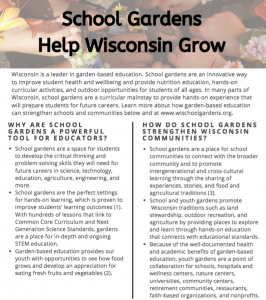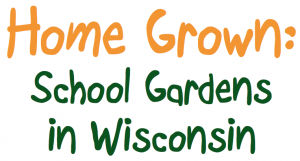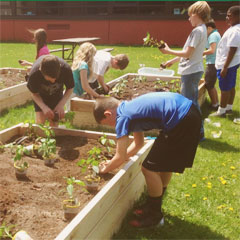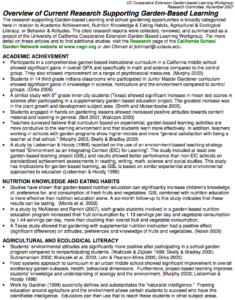 School gardens are an innovative way to improve student health and wellbeing and provide nutrition education, hands-on curricular activities, and outdoor opportunities for students of all ages. In many parts of Wisconsin, school gardens are a curricular mainstay to provide hands-on experience that will prepare students for future careers. This document provides talking points to help explain the wide-reaching benefits of garden-based education. View Resource »
School gardens are an innovative way to improve student health and wellbeing and provide nutrition education, hands-on curricular activities, and outdoor opportunities for students of all ages. In many parts of Wisconsin, school gardens are a curricular mainstay to provide hands-on experience that will prepare students for future careers. This document provides talking points to help explain the wide-reaching benefits of garden-based education. View Resource »
Homegrown: School Gardens in Wisconsin
 From the Department of Public Instruction. Children are more likely to absorb and integrate food knowledge if they have real-life contact with agriculture. School gardens offer a wonderful medium for students to get their hands dirty and learn about food, agriculture, and nutrition. This document profiles schools and walks through best practices to create a productive and lasting garden-based education program. View Resource »
From the Department of Public Instruction. Children are more likely to absorb and integrate food knowledge if they have real-life contact with agriculture. School gardens offer a wonderful medium for students to get their hands dirty and learn about food, agriculture, and nutrition. This document profiles schools and walks through best practices to create a productive and lasting garden-based education program. View Resource »
Advancing Farm to School: Lessons from the Field
 This document contains a collection of recommended resources and “lessons learned,” from fourteen organizations that each received a Community Transformation Grant in 2011. The grantees were asked to prioritize farm to school as the main strategy for achieving healthy food systems access and obesity prevention. We especially enjoyed the chapters on Integrating Farm to School in School-Based Policies, Cultivating Prosperous Community Gardens, and Striving for Farm to School Sustainability! View Resource »
This document contains a collection of recommended resources and “lessons learned,” from fourteen organizations that each received a Community Transformation Grant in 2011. The grantees were asked to prioritize farm to school as the main strategy for achieving healthy food systems access and obesity prevention. We especially enjoyed the chapters on Integrating Farm to School in School-Based Policies, Cultivating Prosperous Community Gardens, and Striving for Farm to School Sustainability! View Resource »
Steps to a School Garden
 This website from the Collective School Garden Network has great resources for planning a garden, gaining community support, and implementing your plan, including lesson ideas and research on the benefits of garden-based education. View Resource »
This website from the Collective School Garden Network has great resources for planning a garden, gaining community support, and implementing your plan, including lesson ideas and research on the benefits of garden-based education. View Resource »
Overview of Research Supporting Garden-Based Learning
 This of research comes from the University of California-Cooperative Extension, 2007. View Resource »
This of research comes from the University of California-Cooperative Extension, 2007. View Resource »
